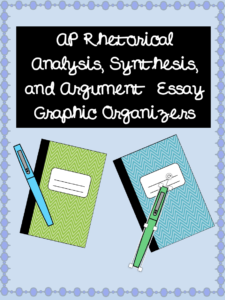
Are you confused by the AP English rubrics? Do they seem subjective? Read on to discover how to simplify the process of understanding the AP writing rubric and score higher on the AP test!
In 2019, College Board updated the AP writing rubrics for English from a 9-point scale to a 6-point scale. While this change was an adjustment for both students and teachers, the new rubrics scale down some writing concepts for more simplification during the review and grading process.
So . . . let’s get down to what’s important.
When approaching any AP timed writing, your goal should be to know what instructors or AP readers are looking for before you even begin to write. This means reading and analyzing the rubric beforehand so that it is in your mind before, during, and after the writing process. Sound daunting? Allow me to simplify this for you!
Remember, you only have about 40 minutes to write each of the three essays, and this time will fly! In this post I’m breaking down the AP English writing rubric in brief, understandable pieces so that you can concentrate on your content, rather than waste time reading (and re-reading) the rubrics during the timed writing.
As you read, keep the following in mind: Essays are scored on a scale of 1-6, with 6 being the highest score.
THESIS (0 or 1 Point):
That’s right! It’s either 0 or 1. All or nothing. This can sound intimidating, but take comfort in the fact that most students DID earn the thesis point in 2021. 
To earn this (1) point, students need a defensible thesis that responds to the prompt and establishes a line of reasoning. With that said, it makes sense to place the thesis statement early in the essay (within the first short, introductory paragraph). There is not much time for a fully thought-out introductory paragraph, so the writer needs to state only what is needed and include their thesis statement (what they will prove) to earn this point. In the Language and Composition essays, the thesis will establish why/how the writer of the provided passage makes his or her point (rhetorical analysis essay), take a stance on a topic (argument), or utilize evidence provided to establish the best line of reasoning for a topic (synthesis). Regardless of the prompt, the writer needs to form clear ideas for their position and line of reasoning (don’t be wishy-washy!). Create a sentence or sentences that give the direction and/or position that this essay will take (without saying “This essay will . . .”). The first paragraph and thesis are the first impressions the reader will have on this piece of writing, so make the writing clear, establish the point, and move on to the body paragraphs (the most important part!)
EVIDENCE AND COMMENTARY (0-4 Points):

Here it is! The “meat” of the essay. The part that will set advanced writers apart. While earning all 4 points on this section may be more challenging than earning the thesis point, there are ways to ensure that you are covering your bases for what AP graders are looking for. Here are the essential pieces, you’ll want to consider:
- Providing evidence
- Linking the evidence/ideas to the thesis
- Providing well-developed commentary (analysis!)
- Cleaning up grammatical/usage errors
So, what does this mean?
For the AP English Language and Composition exam, graders will look for writers to include the best, most prominent evidence from the passage(s) provided for the Rhetorical Analysis and Synthesis Essays. For the Argument Essay, the evidence will come from the writer’s brain (your experience, observations, and/or readings). No matter what, citing this evidence, then linking it back to the point you have made in the thesis statement is essential. The grader does not need (or want) a summary of the passages or articles chosen for the exam. Instead, they are looking for you to give in-depth analysis and provide insight (commentary!) on the information in order to connect it back to your main point. As a rule of thumb, AP graders will typically overlook a minor grammatical or usage error because they realize that students are writing a “draft” of an essay. A seasoned writer who has practiced with these types of essays will most likely make fewer errors when working under a time restraint and when (probably) nervous. Bottom line: Practice! Practice! Practice! The more comfortable you feel with sample AP writing prompts, the writing process, and editing/revision, the less likely you are to lose points for errors in grammar and usage.
Here’s the truth: this can be stressful, but remember, breathe. Your goal is to provide commentary that helps to support the evidence you have noted from the passages (or from your brain in the case of the argument writing). The thesis is the glue that holds your writing together; you should link back to your thesis in each main body paragraph in order to prove your point.
SOPHISTICATION (0-1 Points):
Alright . . . so this is the tough point. I’ve heard this described as the “magical” point or the “unicorn” point. It seems that even in the Spring of 2021, this point was difficult for students to earn. Why? Well . . . this point is based on the complexity of the response, the writer’s ability to understand rhetorical situations, and the strength of the writer’s voice and word choice (something that does not come naturally to everyone and can take time to develop).
The good news is that, with practice, students CAN develop a stronger voice and improve word choice in their writing. Reviewing a list of strong verbs may help as well. Varying sentence structure and cutting the “fluff” also helps improve writing overall and can assist in earning this “mystical” point.

So, what can help overall?
Look for ways to incorporate daily writing practice into your life. You may already be receiving this kind of practice in your English class, but if you feel like you need more, try writing for a brief 15-30 minute period each day. Set a timer for this. Look up some prompts on the AP College Board website. You don’t have to write full essays each time, but brainstorm ways that you would start to gather ideas for your response. Use a graphic organizer like this one to practice brainstorming for the Rhetorical Analysis, Synthesis, and Argument Essays. Honestly, the more you practice with this kind of writing, the easier it will get and more second-nature it will become.
Finally (again), breathe. As the AP high-stress study season approaches, don’t forget to silence your brain for a few minutes each day. Watch a movie. Text with a best friend. Do some yoga. Whatever gets you in the zone to rest and recharge because that is how you will be your best self.
If you’ve taken an AP exam in the past, what advice would you offer students taking them for the first time in the Spring? Type in the comments below.
edulany
18 Jan, 2022
